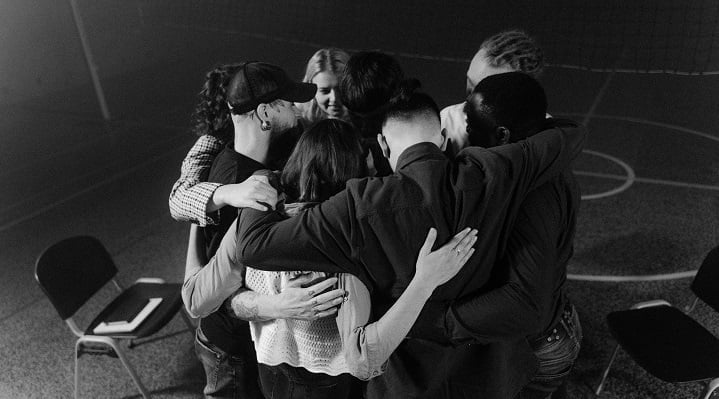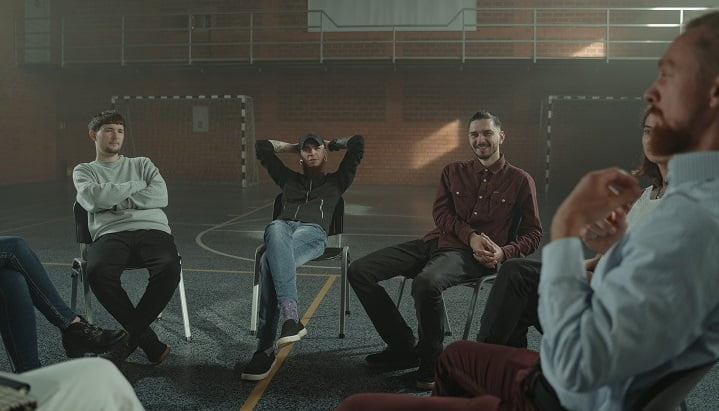Building Your Support System for Successful Sobriety
Facing your addiction head-on and seeking treatment is an incredibly brave thing to do.
However, it’s important to remember that it’s just as important and just as brave to lean on other people for support during this time.
Making the effort to reach out to others and build up your support system is one of the most effective things you can do for your recovery.
What is a healthy support system?

A support system is a network of people and organisations that you can lean on while you are recovering from a drug addiction or alcohol addiction.
These are healthy relationships with people who want the best for you. Your support system is filled with people cheering you on and supporting your recovery.
This can include professionals, friends, family members and other people who are recovering from addiction.
Everyone’s support system will look different – some people will be able to lean on supportive family and friends, while others will focus more on professional therapists or spiritual groups.
No matter what your support system looks like, just remember that you don’t have to do this alone.
Why is it important to build your support system in addiction recovery?

A support system sounds good in theory, but do you really need one?
The idea of keeping your problems to yourself may seem appealing, but reaching out to other people can actually help you to stay sober.
As well as treating the active addiction, rehab clinics and treatment programmes are also focused on combating loneliness.
Studies have found [1] that people who are living with drug addiction experience stronger feelings of loneliness than the general population, which can lead to relapse if not addressed.
Forming healthy and supportive relationships with other people during recovery can help you to better manage stress, give you a sense of purpose and inject a feeling of community and belonging into your life.
As a result, you are more likely to stay sober and be able to support other people in the same way.
Where can I meet other sober people and build a successful support system?

The best support networks often feature multiple types of support, from sober friends and family members to professional organisations and counsellors. [2]
Below are some of the most common and effective places to meet other sober people and build a successful support system.
12-Step groups and other recovery meetings
Regular support meetings – like those offered by Alcoholics Anonymous, Narcotics Anonymous or SMART Recovery – are a key part of recovery, and finding a group that you can commit to can make a huge difference to your sobriety.
Members share their thoughts, experiences and emotions during these meetings and focus on ways to live a sober, happy life.
It’s a great place to meet people who share your recovery goals and to feel a sense of community.
Professional counsellors and therapists
Most rehab clinics recommend seeking professional counselling after you leave rehab, even if you attended therapy during your treatment.
Counselling can provide a safe space to express your emotions and work through problems, and a good therapist can help you to feel cared-for and supported.
Sober family members and friends
It’s important to lean on the friends and family members you can trust while going through addiction recovery, and these people can make up the core part of your support network.
They will always be there to cheer you on and pick you up, and there’s less chance of being triggered by them if they’re sober.

Spiritual communities
Many people find spiritual communities such as churches or meditation groups to be a huge source of support when going through addiction recovery. [3]
These groups often foster open communication and pull ranks around their members to ensure they feel supported during hard times.
If you have religious or spiritual beliefs, consider joining a reputable organisation that shares these values.
Sober living houses
You may still require support once you leave rehab, and sober living houses can be an effective way to transition back to regular life after addiction treatment. [4]
These houses provide short and long-term accommodation where you will live alongside other people who have also completed a rehab programme.
Over time, these people can become a core part of your support network.
Rehab alumni groups
If you attended a rehab clinic as part of your addiction treatment, it’s worth reaching out to them for details about any alumni groups they may offer.
These groups provide additional support to former clients, often organising meet-ups and providing ways for people in recovery to meet and share their experiences. It can be a great way to connect with other people who are going through the same thing.
How do I build my support system for successful sobriety?

As well as the options above, we’ve listed some additional tips that will help you build a support system from scratch.
These methods can increase your chances of staying sober and allow you to create a full and enriching life.
Work out what support looks like for you
Everyone is different, so what feels supportive and right to someone else may not be the same for you.
It can be helpful to sit down and really think about the types of support that would benefit you most.
If you’re someone who needs to connect on shared values, a spiritual community may be a great support system. If you need an unbiased and professional connection, you could look into finding a good recovery therapist.
Taking the time to reflect on what would be most helpful to you is a great first step towards building your support system for successful sobriety.
Attend support meetings regularly
As we mentioned above, attending regular support meetings is one of the best ways to build a support system.
It’s important that you don’t feel alone and isolated during this time. It’s easy to feel like you’re the only one going through this, but the truth is that there are many people struggling with addiction and working through recovery.
You can meet like-minded people at these meetings, and you’ll foster a strong sense of community by supporting them and allowing them to support you.
Reach out to supportive family and friends
Starting with the people who already know and love you is often the most effective way to begin building your support system. And who better than your sober and supportive friends and family members?
This can also be a good opportunity to mend damaged relationships that may have occurred when you were living with an active addiction.
Don’t worry if you don’t have support from your family or friends. There are so many other ways to build your support system, and you deserve to lean on people who are truly there for you.

Know how to recognise an unhealthy relationship
It’s important to know what to look for when it comes to seeking support, but it’s just as crucial to recognise the signs of an unhealthy relationship.
Addiction recovery is a vulnerable time, and it can often be easy to fall in with people who don’t have your best interests at heart. Everyone should have their own boundaries, but if someone you love doesn’t support your recovery, uses drugs or alcohol in front of you, or refuses to treat you with the respect you deserve, then they shouldn’t be in your life.
Avoid getting into romantic relationships during your first year of recovery
While we recommend reaching out to like-minded sober people to build your support system, a general rule of thumb is that you should avoid getting into any romantic relationships during your first year of recovery.
A new partner may seem exciting, but they can also be a distraction from your recovery.
The ups and downs that often come with fresh relationships can also be potentially triggering and could contribute to a relapse.
Instead, lean on sober and supportive friends and family members as well as the other services we discussed earlier in this article.
Don’t worry, you will be in a position to date again once you are more established in your sobriety.
Why is sobriety so important during addiction recovery?
Although some organisations believe addiction recovery is possible while still using substances responsibly, many studies have found complete abstinence to be the most effective method.
Choosing to be sober takes the decision-making out of substance use.
You don’t need to set yourself a limit or deal with the temptation to have ‘just one more’ as you’ve already made the decision to remain abstinent.
Your physical and mental health can improve drastically once you stop using drugs and alcohol. Many people report feeling better than ever, with increased energy and fewer symptoms of depression or anxiety.
Staying sober also frees up so much time in your life. This is time that you would have once spent purchasing, using and recovering from substances that you can now put into your career, family, friends and hobbies.
What are the benefits of building a support system during addiction recovery?

If you still aren’t convinced that you should begin working on your support system, think about the positive impact that this can have on your life and recovery.
Some of the benefits of building a support system during addiction recovery include:
- Increased chances of staying sober in the long term
- A sense of community and belonging
- Feeling connected to others
- Being supported when you need it
- The opportunity to support other people
- Motivation and a reason to get out of bed in the morning
- Repairing damaged relationships and forming new ones
- Fun distractions from the stress of recovery
- Learning what healthy and unhealthy relationships look like
Building a support system may seem like hard work at first, but the rewards are worth the effort.
What should I do if I don’t have anyone in my life to reach out to?

It’s common to feel alone during addiction recovery, particularly if your family are no longer in your life and you struggle to make close friends.
There’s no need to give up on building a support group if you’re in this situation, as you still have so many options.
A professional counsellor can be a core part of your support network. If you don’t have room in your budget for private therapy, the NHS offers a range of free services that you may be eligible for. [5]
Support groups are another important part of your recovery, and we recommend finding a meeting that you can commit to regularly.
Here you will meet people in similar situations who will be only too happy to support you.
Will I need to maintain this support group for the rest of my life?

Choosing how long to maintain your support group for is ultimately up to you.
Of course, some people, such as supportive friends and family, will likely always be a part of your life.
But if you don’t want to attend support meetings or counselling for the rest of your life, you don’t have to.
It’s important to always have some form of support, but this may evolve and change throughout the years.
Some people choose to attend regular group meetings for the rest of their lives, while others taper off their attendance after a few years or stop going completely.
As long as you continue to prioritise your sobriety and maintain some form of support, you’re doing the right thing.
Seeking help for addiction and getting sober

To learn more about the importance of support during recovery, visit Rehab Recovery.
Our website is filled with information about every aspect of addiction and treatment including advice for friends and family members and the different types of professional counselling available.
If you’re living with a drug or alcohol addiction and are looking for treatment, we also offer a free referral service.
After conducting an over-the-phone assessment we can refer you to some of the top rehab clinics in the country based on your budget and individual needs.
All information is treated in the strictest confidentiality, so you can be honest without worrying that someone in your life will find out.
Get in touch today on 0800 088 66 86 and start building your support network for a successful addiction recovery.
References
[1] https://www.ncbi.nlm.nih.gov/pmc/articles/PMC4295122/
[2]https://www.ncbi.nlm.nih.gov/pmc/articles/PMC5047716/
[3] https://www.ncbi.nlm.nih.gov/pmc/articles/PMC6759672/
[4] https://www.jsad.com/doi/full/10.15288/jsad.22-00307
[5] https://www.nhs.uk/live-well/addiction-support/drug-addiction-getting-help/




